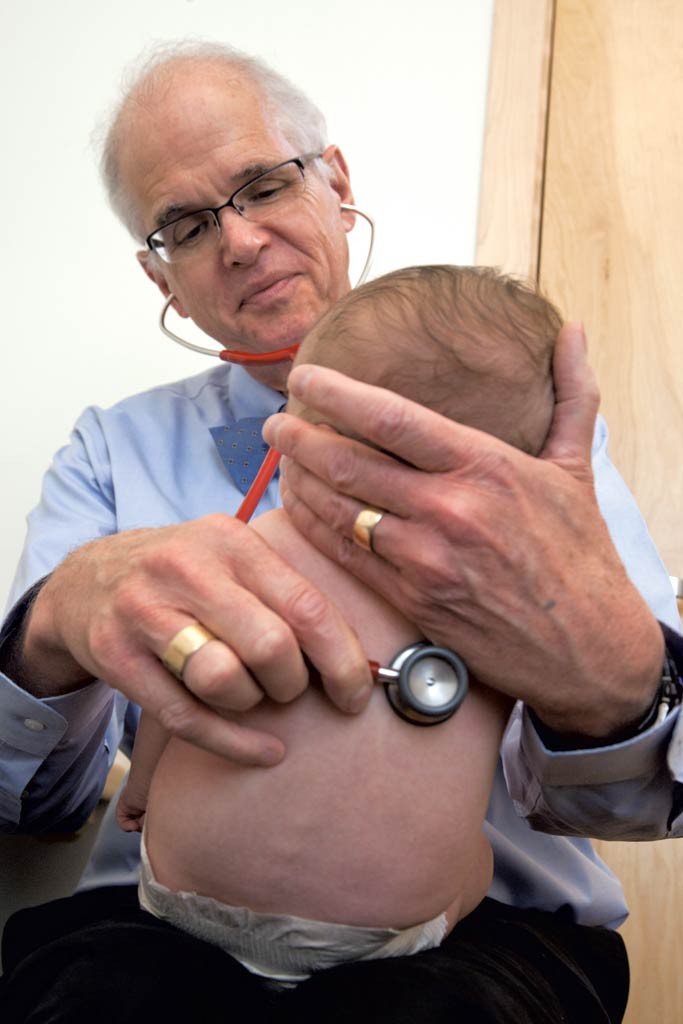
- Matthew Thorsen
- Dr. Joseph Hagan examines a patient
After 35 years as a Burlington pediatrician and a University of Vermont medical school professor, Dr. Joseph Hagan fields a lot of daily phone calls — from current and former students, fellow doctors, and other health care providers who seek his advice on difficult and complex cases. But when the call is from a state's attorney or police officer, usually it's too late to help save the patient.
Hagan, 63, is Vermont's resident expert on abusive head trauma (AHT), more commonly known as "shaken baby syndrome." In 2009, the American Academy of Pediatrics adopted the more inclusive term in recognition that many of the serious injuries that infants and toddlers suffer at the hands of adults aren't caused by shaking alone. Gripping, squeezing, slamming or wrenching their small bodies can also result in permanent injury or death.
So far this year, physical abuse has allegedly claimed the lives of at least three young children in what Chittenden County State's Attorney T.J. Donovan described last week as an "unprecedented run" of child fatalities. A fourth death, that of a 4-week-old Burlington infant, was referred to criminal investigators last Thursday, the same day Hagan spoke with Seven Days. The state routinely contacts Hagan to help determine precisely what caused a child's death.
But Hagan, who has a contract with the state to help investigate these tragic situations, says other, equally serious cases of abusive head trauma have occurred in Vermont this year that haven't gotten any press coverage. Some have left kids in a permanent vegetative state or with lifelong, debilitating conditions such as cerebral palsy, blindness, learning disabilities or seizure disorders . But without a death or criminal charges — which can be very difficult to prove in a court of law — the public never learns about them.
Essex County State's Attorney Vince Illuzzi says he's working with Hagan on a case right now in which a young child was left permanently disabled by an abuser. But because it involves a CHINS — a child in need of care or supervision — petition, which by law is confidential, neither Hagan nor Illuzzi could discuss any details.
Illuzzi warned it's not an isolated case. "If you looked at the numbers of these cases statewide, you'd probably be surprised," he said. "Even in small counties there are kids physically or sexually assaulted, and people never learn of it because no charges were brought."
That's one reason Attorney General Bill Sorrell called on state lawmakers last week to scale back some of the privacy protections on cases referred to the Department for Children and Families. Critics have accused the agency of dropping the ball in two recent child-abuse deaths. The families of Dezirae Sheldon of Poultney and Peighton Geraw of Winooski were both known to the agency.
Hagan said that while he agrees with the outcry for more public discussion and scrutiny of child-abuse cases, he's "a bit troubled" by the attorney general's campaign for greater access to DCF files and family court cases, fearing the state will adopt an all-or-nothing approach to privacy. Clearly, when something horrendous happens to a child, he said, the decision whether to return that child to his or her parent becomes very difficult. But he's not convinced that making cases more public will make that decision any easier.
One problem, he explained, is that it is often difficult to determine exactly what happened or even pinpoint the mechanism of injury. Recently, Hagan fielded a phone call from an emergency room physician about an "odd-looking burn" on a child, as Hagan described it. Although the burn didn't fit the normal pattern for an accidental injury, he said, it didn't fit the usual profile for child abuse either.
Ultimately, the injury was deemed accidental, which explains why Hagan can't provide more details. Had that case been open to public scrutiny, he pointed out, a lot of needless harm might have come to both the child and parent.
"You can get on the child-abuse registry for having abused someone simply because DCF said you did," Hagan said. "You can have your child taken into state custody based on the 'preponderance of evidence.' But you're only going to get charged if it's likely to hold up before a jury beyond a reasonable doubt."
Hagan offered another pragmatic concern: When a child-abuse case goes public, so does the name of the victim.
"If it's a 6-year-old whose case becomes part of the public discourse, does the kid now have to change schools?" he asked. "I think there are a lot of unintended consequences we need to think about. What are we going to get by making it more public? That's what I'm not clear on yet."
State's Attorney Illuzzi said he would support increased public disclosure on a "case-per-case basis."
Hagan, a native of the Washington, D.C. area, first developed an interest in child-abuse prevention back in the mid-1970s, while he was still a resident at the University of Vermont College of Medicine. He joined the faculty there in 1979.
"I realized ... that these cases make me incredibly angry," Hagan recalled. "But I also realized that in order to be an effective pediatrician," that reaction "was not going to serve me well, so I began to study it."
Hagan's interest predates the term "shaken baby syndrome," which didn't appear in medical literature until 1984. It wasn't until the late 1980s and early '90s that pediatricians began to fully grasp the effects of abusive head trauma, where the brain sloshes back and forth inside the skull like a bag of water, breaking blood vessels, causing swelling and killing neurons.
For nearly three decades, Hagan has been on the front line of abuse prevention in Vermont. In the mid-1980s, he helped the state develop its regulations governing infant medical neglect. Soon thereafter, he was hired to be the state's medical consultant on large and complex child-abuse cases; these days he fields about four to six such cases each year. For the last 19 years, Hagan has also volunteered to either chair or cochair DCF's citizens advisory committee, which reviews all known instances of serious child abuse.
While Hagan acknowledged the recent cluster of "horrendous cases" this year, he pointed out that the problem of AHT isn't a new one. In general, it often happens to children before age 1; infants between three and four months are at the highest risk. That's when babies typically cry the most, he said, which can trigger a sudden, violent outburst on the part of a parent.
Are there typical perpetrators of AHT? Interestingly, Hagan said that in his experience, the problem cuts across all socioeconomic lines, just like alcoholism and opiate abuse. And, contrary to popular opinion, he said, most offenders aren't mentally ill, alcoholics or drug addicts, though those problems can predispose a parent to abusing a child. As he put it, "It's very important that we not take the view that it's 'those people.'"
Typically, he explained, there are three factors that coalesce into a "perfect storm" for AHT. First, parents may be predisposed to abusive behavior, perhaps because they, too, were raised in abusive households or are managing chronic stressors in their lives such as a bad marriage, a substance problem or employment difficulties.
Second, Hagan said there's usually some "provocative" behavior on the part of the child, such as a tantrum, an uninterrupted bout of crying or defiant behavior by an older child.
Finally, Hagan said there's usually an "inciting event" such as a lost paycheck or a job dismissal that finally pushes the parent over the edge.
Why does it seem that Vermont is experiencing a spike in both the frequency and seriousness of these cases? Hagan suggested that one underlying cause may be "toxic stress" — that is, strong, frequent and prolonged adversity caused by persistent poverty, substance abuse, food insecurity and violence in the home that can actually alter the functioning of the brain by causing neurons to not divide or grow. Researchers now believe that this effect can last not just for one lifetime, but even change the way people's DNA functions over multiple generations in a process called epigenetics.
"It's very difficult to change the epigenetics once it happens," Hagan said. "So now we have this multigenerational experience that's very hard to break."
Is epigenetics, like global warming, payback for bad practices over the past century?
"Maybe," Hagan suggested. If so, he said, addressing the problem will take more than just hiring a few more DCF investigators and social workers. It'll take more "inputs upstream to prevent those needs down the road." Hagan said he isn't sure whether Vermont can muster the "enormous political will and heavy investment" that would require, especially for gains that may not be seen for a generation.
But after 34 years of practicing medicine, he's not giving up. Hagan likened this campaign against toxic stress to that of childhood nutrition, then later mass immunization, which helped launch the field of pediatrics more than a century ago. Nowadays, he said, pediatricians have begun asking parents not just about their children's health but also about what else is happening in the household.
Years ago, the doctor's question, "How are you all doing?" was merely a conversational icebreaker. Today, it could save a life.
Disclosure: Ken Picard's wife, Stacy Graczyk, works as a deputy state's attorney in Chittenden County.











Comments
Comments are closed.
From 2014-2020, Seven Days allowed readers to comment on all stories posted on our website. While we've appreciated the suggestions and insights, right now Seven Days is prioritizing our core mission — producing high-quality, responsible local journalism — over moderating online debates between readers.
To criticize, correct or praise our reporting, please send us a letter to the editor or send us a tip. We’ll check it out and report the results.
Online comments may return when we have better tech tools for managing them. Thanks for reading.